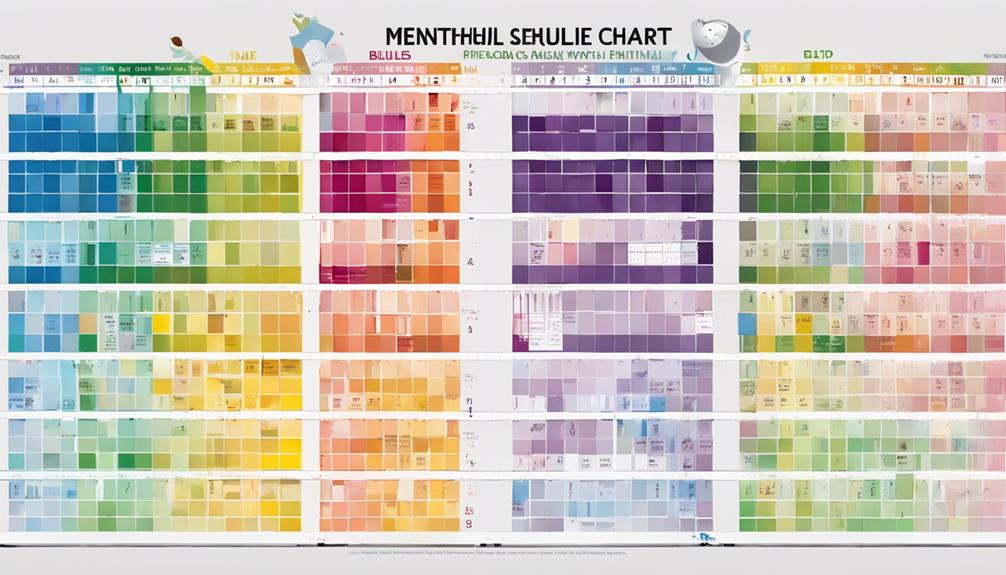While enjoying our Diet Cokes during a playdate, my friend expressed her worry about the potential impact of her caffeine intake on her baby while breastfeeding. This conversation led us to consider the delicate balance of managing diet soda consumption while nursing.
Understanding the nuances of this delicate equation is essential for the well-being of both mother and child. So, how can we navigate this terrain of fizzy cravings and maternal health?
Let's explore some practical tips and insights to help us make informed choices for a healthy breastfeeding journey.
Key Takeaways
- Limit Diet Coke intake to prevent negative effects on breast milk composition.
- Moderation in caffeine consumption crucial for maternal and infant well-being.
- Opt for water and nutrient-rich beverages over Diet Coke.
- Consult healthcare provider for personalized advice on managing Diet Coke consumption.

Air Purifiers for Home Large Room up to 2200sq.ft, MOOKA Air purifier for Home Pets with Washable Filter, PM 2.5 Display Air Quality Sensor Air Cleaner for Bedroom, Dorm room, Pets, Office PR1 (White)
MORE AIR INTAKE & HIGH-EFFICIENCY: This is the 2024 latest MOOKA PR1 HEPA air purifiers for home. To...
As an affiliate, we earn on qualifying purchases.
Impact of Diet Coke on Breast Milk
Consuming Diet Coke while breastfeeding may impact the composition of breast milk due to the presence of aspartame, a commonly used sweetener in the beverage. Aspartame can be metabolized in the body, potentially leading to increased levels of phenylalanine in breast milk. While research suggests that typical amounts of aspartame from Diet Coke are generally safe for breastfed infants, caution is advised for those with phenylketonuria. Additionally, diet drinks containing low-calorie sweeteners, like Diet Coke, could elevate the risk of vomiting in breastfed infants.
Although there's limited data on the specific effects of aspartame and its methanol metabolite on infants, nursing mothers should be mindful of their Diet Coke consumption. The transfer of aspartame and its metabolites to breast milk raises concerns about potential impacts on the health of infants. It may be prudent for breastfeeding women to moderate their intake of Diet Coke to secure the well-being of their little ones.

LEVOIT Air Purifiers for Home Large Room Up to 1875 Ft² with Washable Pre-Filter, AHAM VERIFIDE, Air Quality Monitor, HEPA Sleep Mode for Allergies, Pet Hair in Bedroom, Vital 200S-P, White
𝐖𝐇𝐘 𝐂𝐇𝐎𝐎𝐒𝐄 𝐀𝐇𝐀𝐌 𝐕𝐄𝐑𝐈𝐅𝐈𝐃𝐄 𝐏𝐑𝐎𝐃𝐔𝐂𝐓𝐒: AHAM (Association of Home Appliance Manufacturers) is an ANSI-accredited organization that sets strict...
As an affiliate, we earn on qualifying purchases.
Safe Caffeine Levels for Nursing Moms

When considering the impact of Diet Coke consumption on breastfeeding, it's important to understand the safe levels of caffeine for nursing moms. Here are key points to keep in mind:
- Recommended Daily Intake: Breastfeeding mothers are generally advised to limit their caffeine intake to around 300 mg per day, which is roughly equivalent to consuming two 12-ounce cans of Diet Coke.
- Infant Reactions: Excessive caffeine consumption can result in irritability, poor sleep, and fussiness in breastfed infants. Caffeine from Diet Coke can transfer into breast milk, potentially affecting infant sleep patterns and behavior.
- Moderation is Key: While moderate consumption of Diet Coke is considered safe for most breastfeeding mothers, it's essential to monitor infant reactions closely. Limiting the intake of Diet Coke can help prevent potential negative effects on both maternal and infant health during the breastfeeding period.
Maintaining a balance in caffeine consumption is crucial for the well-being of both the mother and the breastfed infant.

Air Purifiers for Home Large Rooms up to 3500 Ft², H13 True HEPA 0.1 Micron 99.97% Filtration with Carbon Filter, 235 CFM CADR, Removes Allergens, Pet Odor, Smoke, VOCs, 30dB Sleep Mode, PM2.5 Display
H13 True HEPA + Carbon Filter – Removes Allergens, Odors & Smoke: Equipped with H13 True HEPA (0.1μm,...
As an affiliate, we earn on qualifying purchases.
Tips for Balancing Consumption
To maintain a healthy balance while breastfeeding, it's important to think about practical strategies for managing Diet Coke consumption. Limiting the intake of diet Coke can reduce the risk of infant vomiting associated with low-calorie sweeteners.
Balancing your diet Coke consumption with water and other hydrating beverages is essential for maintaining proper hydration levels during breastfeeding. Instead of reaching for a can of diet Coke, consider opting for nutrient-rich snacks like fruits, nuts, or yogurt to support a healthy diet while lactating.
Monitoring your diet Coke intake is vital in preventing excessive exposure of low-calorie sweeteners to your breastfeeding infant. If you have concerns about managing your diet Coke consumption while breastfeeding, consulting a healthcare provider can provide personalized advice tailored to your specific situation. Remember, your healthcare provider is there to support you in making the best choices for both you and your baby's health.

LEVOIT Air Purifier for Home Bedroom Dorm Room, Smart & Voice Control, AHAM Verifide, 3-in-1 Filter With HEPA Sleep Mode, for Pollen, Pollutants, Smoke, Dander, Dust, Core 200S-P, White
𝐖𝐇𝐘 𝐂𝐇𝐎𝐎𝐒𝐄 𝐀𝐇𝐀𝐌 𝐕𝐄𝐑𝐈𝐅𝐈𝐃𝐄 𝐀𝐈𝐑 𝐏𝐔𝐑𝐈𝐅𝐈𝐄𝐑𝐒: AHAM (Association of Home Appliance Manufacturers) is an ANSI-accredited organization that sets...
As an affiliate, we earn on qualifying purchases.
Managing Cravings and Alternatives

Changing from balancing consumption to managing cravings and alternatives, it's important to contemplate healthier beverage options to satisfy your cravings while breastfeeding. When looking for substitutes for diet soda, consider the following:
- Water: Staying hydrated is essential for lactating mothers. Water not only keeps you hydrated but also helps with milk production and overall well-being.
- Herbal Tea: Herbal teas can provide variety and flavor without the artificial sweeteners found in diet sodas. Be cautious of caffeine content and opt for caffeine-free options.
- Fruit-Infused Water: Infusing water with fruits like berries, citrus, or cucumbers can add a rejuvenating twist to your hydration routine. This natural alternative is free from artificial additives and provides a hint of sweetness without the use of low-calorie sweeteners.
When managing cravings and seeking alternatives to diet soda during breastfeeding, prioritizing healthy beverage choices is key. Consulting with a lactation consultant or healthcare provider can offer personalized guidance tailored to your specific needs and preferences.
Staying Hydrated and Healthy
Staying adequately hydrated is important for breastfeeding mothers, with water being the best choice to maintain hydration levels. While Diet Coke may be tempting, its caffeine and artificial sweeteners are best limited while breastfeeding. Opting for healthier alternatives like water, herbal teas, or fruit-infused water can contribute to overall hydration and well-being.
It's important to note that the caffeine in Diet Coke can pass through breast milk to the baby, potentially impacting their sleep patterns and behavior. Consulting with a healthcare provider for personalized advice on managing Diet Coke consumption while breastfeeding is advisable.
Prioritizing hydration through water intake can benefit both the mother and the baby, ensuring the best health during this critical period. Remember, making small changes like choosing water over Diet Coke can make a significant difference in maintaining hydration levels for both you and your little one.
Frequently Asked Questions
Is It Safe to Drink Diet Coke While Breastfeeding?
Yes, it's generally considered safe to drink diet coke while breastfeeding. Research suggests moderate consumption is fine. Artificial sweeteners like aspartame usually don't pass into breast milk prominently. Consult a healthcare provider for clarity.
How Many Cans of Coke Can I Drink While Breastfeeding?
How many cans of Coke can we drink while breastfeeding? It's best to limit to one or less daily. Excessive intake can transfer caffeine to breast milk, affecting the baby's sleep. Consult a healthcare provider for personalized guidance.
Can Eating Too Much Sugar While Breastfeeding Affect Baby?
Excessive sugar intake while breastfeeding can impact a baby's health. We should be mindful of our sugar consumption as it can lead to weight gain, childhood obesity, and influence taste preferences in infants. Monitoring sugar intake is essential for our babies' well-being.
Does Coca Cola Affect Milk Supply?
We find that Coca Cola can impact milk supply if consumed excessively due to caffeine content. Moderation is key for healthy breastfeeding. Hydration with water is crucial. Consult with a healthcare provider for personalized advice on managing Coca Cola intake while breastfeeding.
Is it Safe to Drink Diet Coke while Taking Lexapro and Breastfeeding?
It is not recommended to drink Diet Coke while taking Lexapro and breastfeeding. It can have adverse effects on both the Lexapro and breastfeeding management. It is essential to consult with a healthcare professional before consuming any products that may interfere with Lexapro and breastfeeding management.
Conclusion
To sum up, managing Diet Coke consumption while breastfeeding is essential for the health of both mothers and infants.
It's important to note that approximately 20% of lactating women in the US consume diet beverages, exposing their infants to potential risks associated with low-calorie sweeteners.
By following safe caffeine levels, balancing consumption, managing cravings, and staying hydrated, breastfeeding mothers can make informed choices to promote the well-being of their babies.









